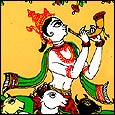 |
|
| 网站指南 | |
| · |
节日 |
| · |
圣地 |
| · |
画廊 |
| · |
音乐 |
| · |
饮食 |
| · |
文化 |
| · |
首页 |
| 音乐 | |
|
奎师那知觉运动通过哈瑞奎师那“玛哈曼陀”音乐唱颂传遍全世界。: Hare Krishna Hare Krishna Krishna Krishna Hare
Hare 施瑞·采坦尼亚·玛哈帕布将奎师那圣名的唱颂普及到整个印度。玛哈曼陀是超然的音振,在我们的内心及心意中唤醒对神的爱。 在全世界许多城市、乡镇都能看到哈瑞奎师那奉献者念诵、唱歌、演奏音乐。在众多活动中,音乐被认为是对神的神圣供奉。 虽然今天的奉献者运用很多种音乐风格,但原始的奉爱音乐是以印度音乐概念RAG和TAL为基础。RAG是一种旋律形式,TAL是一种节奏形式。 Rag is derived from a Sanskrit root meaning 'to colour'. The underlying idea being that certain melodic shapes and scales produce an emotional experience and 'colour' the mind. RAG一字来自梵文字根,意为“染色”。 Tal is best described as time measure and has two main constituents; the duration of the time measure and the distribution of stress within the time measure. Tal, like Rag serves as a basis for composition and improvisation. Devotees most often use the mrdanga (a drum), harmonium (a hand organ), and karatalas (hand cymbals). Lord Krishna is often depicted playing the flute. For more details have a look at the Devotional Instruments section. Since ISKCON has had a worldwide following, some devotional songs have been popularised by western artists including George Harrison and more recently Kula Shaker. |